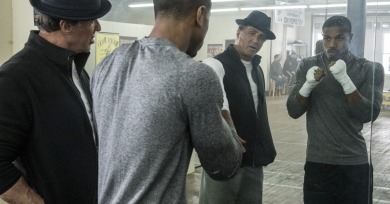Reviews
Chi-Raq is a testament to the power of words. And in a film that mostly shies away from depicting bloody violence onscreen, that’s quite a statement.
It isn’t the conceptual spin that ultimately undoes Kurzel’s Macbeth, but his ponderous approach, hefting each scene on top of the last as though moviemaking was an act of grunting, straining brute force, stacking up a big, bleak cairn.
In Creed, Stallone’s acting, which is tied to but also more complicated than the mere matter of his presence, is the crucial factor which allows the film to triumph within the strictures of the Rocky series, if not quite transcend them.
At least on paper, Anderson’s film, about the making of the album, qualifies as minor in nearly every way: its 54-minute length; its lack of a national theatrical release; its sudden announcement, relatively free from fanfare, less than a year after Anderson’s Inherent Vice. And yet Junun is in other ways a major event.
It’s a film that luxuriates in details, in textures, and specificity of places and costumes, and the particulars of Carol and Therese’s sexuality are absolutely crucial, yet also not the endpoint. What is it they say about finding the universal in the specific?
In most scenes, Mond is aiming for full-on subjectivity—with director of photography Mátyás Erdély’s camera clinging to James for dear life in close-up—so essential backstory details often slide in out of nowhere and take us by surprise.
Those of us already feeling nostalgic for print, and for whom deep investigative journalism seems like a dying art in an era when crossing t’s and dotting i’s seems to be of less and less priority, will come to Spotlight with a sympathetic eye.
In trying to further jostle the moral and emotional order of the Bond universe, director Sam Mendes and his collaborators paradoxically succeed only in stultifying it.
In a political moment fraught with racist and xenophobic attitudes toward the immigrants who live and work in our neighborhoods and cities, In Jackson Heights plays as rebuke and antidote.
Rohrwacher doesn’t seem interested in telling us what we should be thinking; rather she lets us accompany these people from one task to the next. There’s no fetishizing or romanticizing of work or youth, just a matter-of-fact, if narratively furtive, take on communal living and familial interaction.
The Pearl Button functions in a similar mode to Nostalgia for the Light—the filmmaker deploys a series of elements that are unconnected on the surface, using his voiceover musings and taking liberal advantage of the power of metaphor to tie all of his varying strands together.
One of the miracles of cinema is that genuine artists can use the medium to convey otherwise inexpressible, even intangible emotions, using image and sound to create emotional landscapes that in writing might be too explicit or in music too oblique.
Hou’s latest, The Assassin, his first in the wuxia genre, is perhaps his most senses-heightening work yet, a film of simultaneous action and repose, of specificity and abstraction, giving the viewer just enough information to follow its dense narrative avenues while asking that their eyes take the road less traveled.
Like Lincoln, Bridge places value on conversation, negotiation, honor, decency, the ineffable power of giving one’s “word” to another. Spielberg aims to please, yes, but in the one-two punch that is Lincoln and Bridge of Spies, he’s also aiming for something grander.













